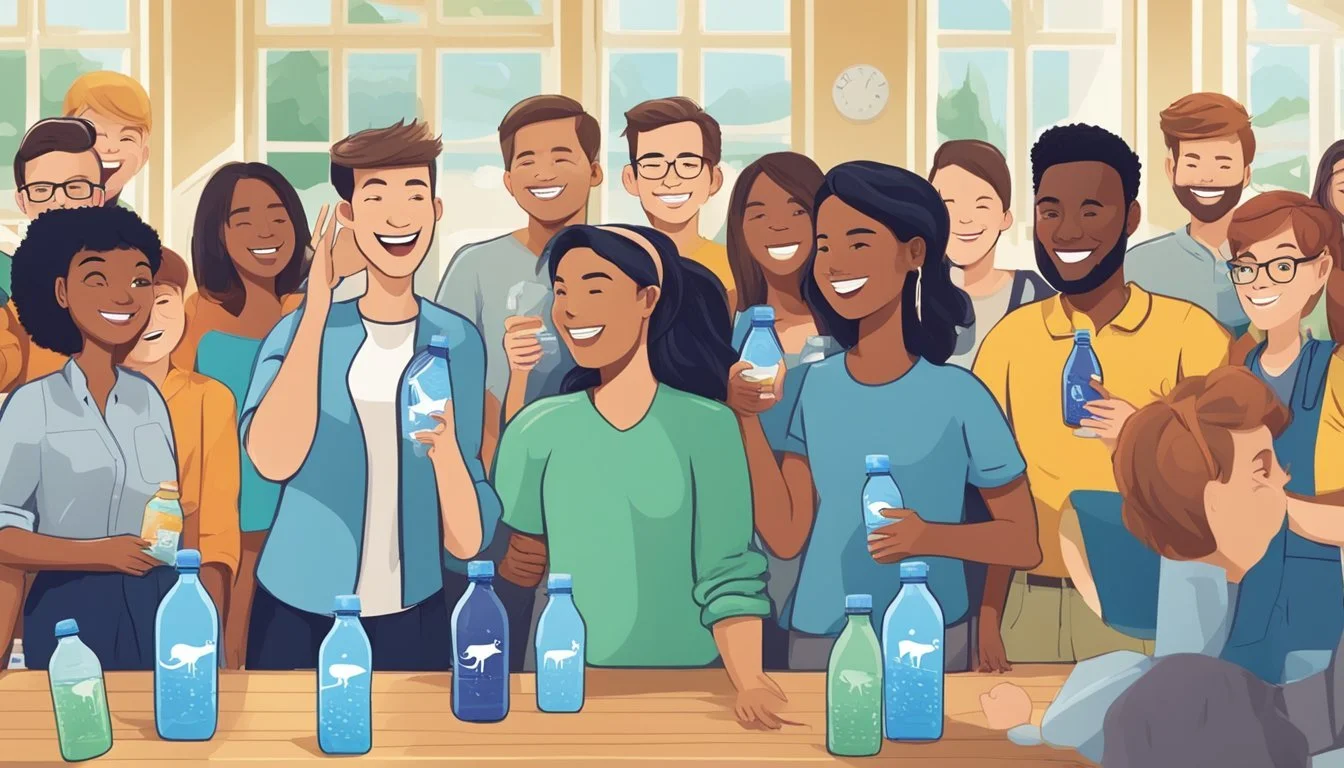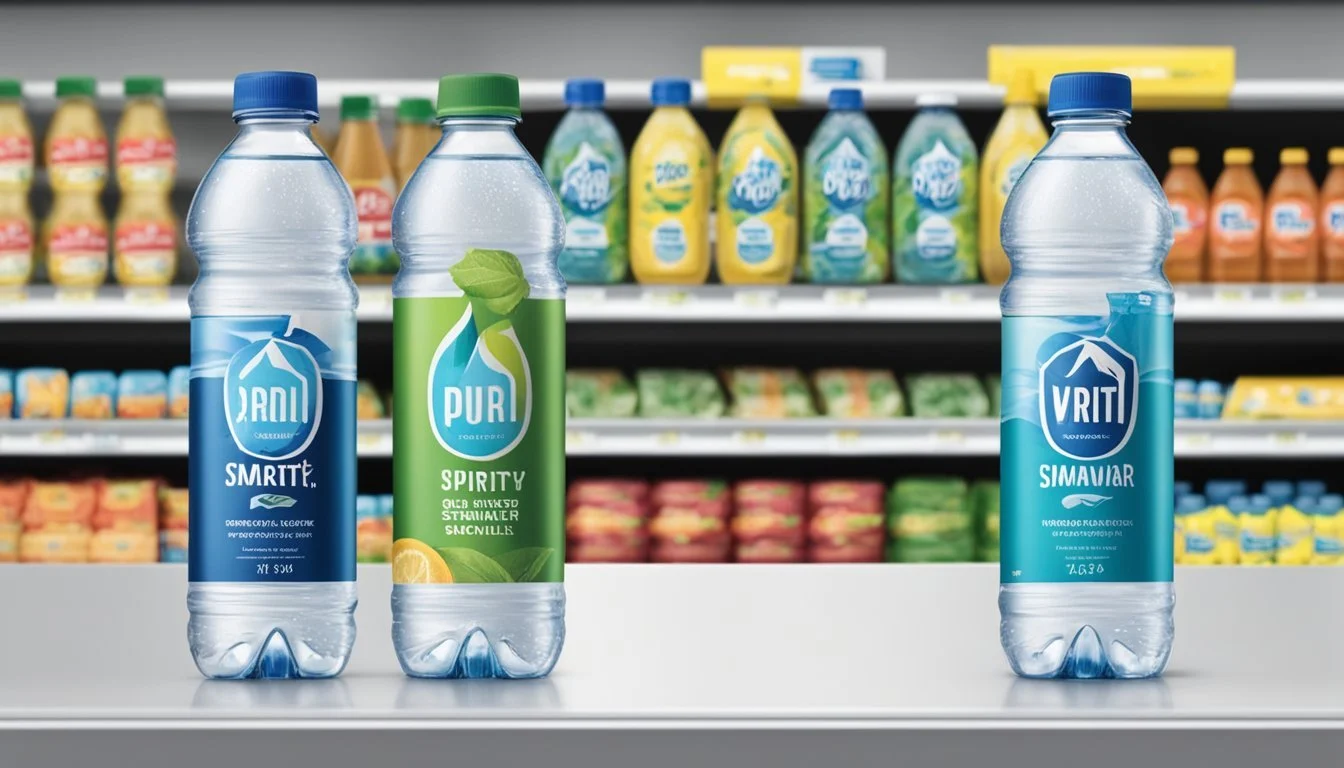Deer Park vs. Smartwater
A Comprehensive Comparison of Bottled Water Brands
In the vast landscape of bottled water, choosing between brands can often come down to personal preference, awareness of water sources, and the specific qualities one desires in their hydration experience. Two prominent names in the industry, Deer Park and Smartwater, stand out for their market presence and consumer appeal. Deer Park boasts its 100% natural spring water sourced from the Eastern Seaboard, emphasizing the crisp and clean taste it claims to offer. This dedication towards maintaining a natural profile may allure consumers who value straightforward spring water without added enhancements.
Smartwater, on the other hand, presents itself with a different approach. It is distilled water, a product of vapor distillation, a process inspired by the hydrologic cycle with added electrolytes for taste. This gives Smartwater its distinct profile, potentially appealing to those who are looking for a purified water option with a boost for taste and replenishment. The choice between Deer Park and Smartwater may ultimately depend on a consumer's taste preference and values, whether they prioritize the unaltered taste of natural spring water or the purified, enhanced experience offered by Smartwater.
The competition between these two brands is not just about taste, but also encompasses brand trust, environmental impact, and scientific quality of the water. Consumers often weigh these factors along with personal health considerations when choosing their preferred bottled water. With the bottled water industry evolving and consumers becoming more informed, debates over water quality and brand superiority have become more nuanced and detailed, making the choice between Deer Park and Smartwater an intriguing subject for examination.
Understanding Bottled Water
In discussing Deer Park and Smartwater, it's crucial to understand the bottled water industry's intricacies, from the types of water available to sourcing, purification processes, and compliance with regulatory standards.
Types of Bottled Water
Spring Water: This water originates from an underground formation where water naturally flows to the surface. Deer Park advertises itself as containing 100% natural spring water.
Purified Water: Water that has undergone processes like reverse osmosis, filtration, or distillation. Smartwater is known to use a filtration and remineralization process that includes adding minerals after purification for taste enhancement.
Water Sources and Purification Process
Sources:
Spring water is collected directly from the spring or through a borehole tapping the underground formation.
Purified water can originate from any source, including municipal supplies.
Purification Processes:
Filtration removes particulates and is often used in both spring water and purified water treatments.
Reverse osmosis and distillation are typical for purified water, aiming to remove dissolved solids and impurities to meet stringent purity standards.
Labelling and Regulations
Labelling: Bottled water labels should comply with the FDA's labeling requirements, indicating the type of water and whether it has been distilled or contains added minerals.
Regulations: The Environmental Protection Agency (EPA) sets regulations for tap water, while the FDA regulates bottled water. Both enforce limits on contaminants like BPA, ensuring safety standards are met.
Water Quality and Health Implications
When considering bottled water like Deer Park and Smartwater, consumers often scrutinize water quality and health implications. Key factors to consider are the pH levels, mineral content, and potential contaminants present in the water.
pH Levels and Alkalinity
Deer Park: It typically boasts a neutral to slightly acidic pH, usually ranging from 6.3 to 8.7, making it close to the pH of pure water. Smartwater: Through its vapor distillation process, Smartwater is designed to have a pH between 6.5 and 7.5, which is then re-mineralized to add electrolytes.
Mineral Content and Electrolytes
Deer Park:
Minerals: Often contains naturally occurring calcium, magnesium, and sodium.
Electrolytes: The natural springs provide essential electrolytes for hydration but in varying amounts depending on the sourcing.
Smartwater:
Minerals: Calcium chloride, magnesium chloride, and potassium bicarbonate are added for taste and electrolytes.
Electrolytes: The added electrolytes are intended to enhance taste and provide potential hydration benefits.
Potential Contaminants
Deer Park and Smartwater both adhere to the FDA's standards for contaminants, which include substances like lead, chlorine, and fluoride, and their levels must stay below regulatory limits. Recent concerns over PFAS chemicals, which can be found in some water brands, have escalated the scrutiny of bottled water.
Lead and Heavy Metals: Testing ensures that levels are below EPA and FDA standards to avoid health risks.
Chlorine: Used in disinfection, its content is negligible post-treatment and poses no significant health risk at the levels found in these bottled waters.
Fluoride: Typically not added in spring water (like Deer Park), while purified waters (like Smartwater) may have varying levels, depending on post-treatment additives.
Both brands aim to meet or exceed health and safety standards, ensuring that the water that reaches the consumer is safe and free from harmful levels of contaminants.
Comparing Deer Park and Smartwater
In evaluating Deer Park and Smartwater, the comparison spans their origins, the processes used in filtration, the taste and effectiveness in hydration they offer, and their environmental footprint through packaging choices.
Company Backgrounds
Deer Park is a brand that falls under the Nestlé umbrella, providing 100% natural spring water. It sources its water mainly from the Eastern Seaboard of the United States. Smartwater, on the other hand, is manufactured by Coca-Cola and is known for its vapor-distilled water, often with added electrolytes for taste.
Filtration and Purity
Deer Park boasts water that comes from natural springs and is naturally filtered. However, due to the source being natural springs, the level of purification may vary. Smartwater, in contrast, uses a vapor distillation process, mimicking the hydrologic cycle, followed by the addition of electrolytes. This process gives Smartwater a distinctly pure and clean profile with every bottle.
Taste and Hydration Effectiveness
When it comes to taste, Deer Park's natural spring water has a fresh and natural flavor that may vary slightly depending on the spring source. Smartwater's vapor distillation process, complemented with electrolytes like calcium chloride and magnesium chloride, is crafted to enhance taste and may improve hydration by replenishing minerals lost during physical activity.
Packaging and Environmental Impact
Both Deer Park and Smartwater use plastic bottles. Deer Park's bottles are 100% recyclable, and it is working towards using 50% recycled plastic in its bottles. Smartwater bottles are also fully recyclable, and Coca-Cola has made commitments to environmental sustainability, though the impact of plastic bottles on the environment remains a concern for both brands.
Consumer Preferences and Perceptions
In the bottled water market, brand image and consumer sentiment play significant roles in shaping preferences. This section explores how consumer behavior is influenced by brand reputation, reports, reviews, and social media.
Brand Reputation and Marketing
Deer Park and Smartwater have crafted distinct identities in the eyes of consumers. Deer Park is often associated with its natural spring water source and positions itself as an everyday hydration choice. In contrast, Smartwater, which is vapor-distilled with added electrolytes, markets itself as a premium option with a technological edge in purification. Their marketing strategies resonate with different consumer segments, influencing the perceived value and preference for each brand.
Consumer Reports and Reviews
Consumer Reports has shed light on the presence of PFAS chemicals in several bottled water brands but did not specifically mention Deer Park or Smartwater. However, reviews from consumers often highlight the clean taste of Deer Park and the purity of Smartwater. These findings are essential as they directly impact consumer trust and preferences. Positive and negative reviews can significantly influence purchase decisions.
Social Media Presence
On platforms like Twitter, both Deer Park and Smartwater engage audiences with different approaches. Deer Park often leverages its connection to nature, while Smartwater focuses on sophistication and a chic lifestyle. This social media presence contributes to shaping public perception and caters to the experiences consumers seek. How followers interact with these brands online can reflect broader consumer sentiments, as social media becomes a barometer for brand health and appeal.
Industry Insights and Ethical Considerations
The following subsections provide a focused analysis of the bottled water industry, touching on market trends, reporting on product safety, and considering the corporate responsibilities of major companies such as Deer Park and Smartwater.
Bottled Water Industry Analysis
The International Bottled Water Association (IBWA) represents an industry characterized by significant consumer demand and stringent regulatory standards. Both Deer Park and Smartwater operate within an industry that has seen growing scrutiny over environmental impact and consumer health concerns, which necessitates continual adaptation to sustainable practices.
Investigative Journalism Findings
Investigative journalists, including figures such as Ryan Felton, have highlighted issues within the bottled water industry, ranging from the presence of microplastics to the discovery of toxic chemicals. These findings play a crucial role in informing consumers and prompting regulatory action to ensure public safety and maintain industry credibility.
Corporate Social Responsibility
Deer Park and Smartwater's parent companies have a responsibility to address the ethical implications of corporate malfeasance. This includes minimizing environmental impact, providing transparent product information, and ensuring they adhere to ethical sourcing and production standards. Corporate social responsibility initiatives are monitored by consumers and advocacy groups, holding these companies accountable for their impact on communities and the environment.
Conclusion and Recommendations
In comparing Deer Park and Smartwater, consumers are presented with the choice between naturally sourced spring water and vapor-distilled water with added electrolytes. The section below will outline considerations for hydration choices and ponder the trajectory of these bottled water brands.
Hydration Choices
When selecting between Deer Park and Smartwater, one should consider the type of water that suits their taste and health needs. Deer Park is sourced from springs and contains natural minerals, while Smartwater undergoes a vapor distillation process and includes added electrolytes designed to emulate the taste and benefits of mineral water.
Deer Park: Natural spring water with a blend of minerals.
Smartwater: Vapor-distilled with added electrolytes for a distinct taste.
The bottom line for hydration is to choose a water that one enjoys and will drink enough of to stay properly hydrated.
Future of Bottled Water Brands
The trajectory of Deer Park and Smartwater may be influenced by consumer preferences and environmental considerations. Each brand brings a different approach:
Deer Park: May appeal to those preferring natural sources and minimal processing.
Smartwater: Might attract consumers looking for water with consistent taste and the potential benefits of added electrolytes.
Both brands must navigate a market increasingly conscious of sustainability and health trends. Moving forward, innovations in packaging and sourcing may become as influential as the water quality itself.
Appendix
This section of the article provides sources and contact details for further inquiry into the comparison between Deer Park and Smartwater.
References
To guarantee the accuracy and reliability of the information presented in the main article, the following sources were utilized:
Consumer Reports Study on bottled water quality (PDF available by request)
Independent Laboratory Test Results (Data tables provided upon email request)
Water Quality Certificates from both Deer Park and Smartwater (PDF format)
For more detailed information, readers can request these documents via email or signal, depending on the availability of the resource.
Contact Information
Should readers have questions or require additional details regarding Deer Park and Smartwater, they may reach out through the following means:
Deer Park Customer Service:
Email: support@deerparkwater.com
Phone: (800) 288-8281
Smartwater Customer Service:
Email: inquiry@smartwater.com
Phone: (877) 547-7272
Availability for signal communications is subject to the respective customer service policies and privacy guidelines of each company.




